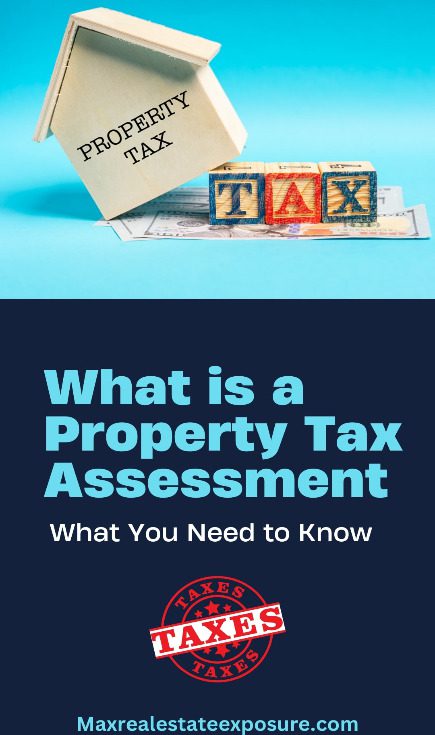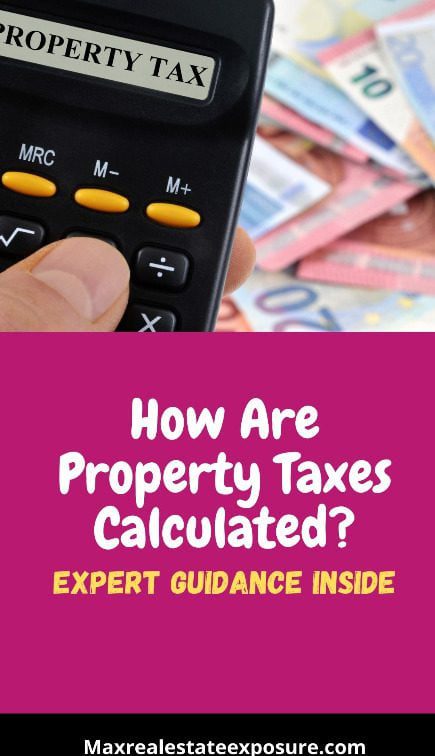Taxes Assessment For Property Explained
 If you have never owned a home before, you’re probably not that familiar with taxes assessments for property. What you pay yearly for being a property owner is known as an assessment tax.
If you have never owned a home before, you’re probably not that familiar with taxes assessments for property. What you pay yearly for being a property owner is known as an assessment tax.
While no one likes paying property taxes, they are necessary to pay for essential services. Property taxes are based on tax assessments, with the money going towards paying for public services in your area.
A tax assessment on your property will determine your tax bill. If you know how tax assessments on the property are calculated, you might better understand how much you will have to budget to cover these costs.
Tax assessments are based on assessed values. The assessed value of all the properties in a community are determined by the local tax assessor. These property taxes are commonly referred to as an ad velorem tax.
Understanding Property Taxes
When you own a home, you must pay taxes on that property. Your local and state governments use these funds to pay for the roads, emergency services, and schools available for you.
Property taxes will need to be paid even on homes that are not your primary residence. So if you own investment properties, vacation homes, or even have land in your name, you’ll need to pay taxes.
Tenants, however, don’t have to pay property taxes as this is their landlord’s responsibility. Property taxes vs. tax assessment have a direct correlation with one another.
What are Property Tax Assessments?
A tax assessment for property determines the value so that the amount of tax due can be calculated. Typically this assessment will be carried out by a government assessor.
For homeowners who have used a mortgage to buy their property, the property taxes are likely part of your monthly payment to the lender. Mortgage lenders will estimate the property taxes and add them to your monthly payment. This money will be paid into an escrow account so that the property taxes will be paid on time and in full.
This means borrowers don’t have to worry about saving enough money to pay property taxes when they are due. A new tax assessment will show you if your escrow payments will likely increase and by how much.
If you have a tax assessment and disagree with the result, it could be possible to appeal the new valuation. You should expect annual increases in your property taxes. It is rare that they go down.
How Do You Find Out Property Assessments?
Assessment notices will be sent out to property owners stating the upcoming years property assessments. These notices are sent out by the county assessor or local tax officials. The property assessment tax will be based your property’s value and the local property tax rate.
The tax rate can be different for residential property vs. business property. Your annual tax bill is always based on real property and not personal property. The tax bill will show the assessed value of a property and the amount of taxes owed.
The assessment of tax can be collected yearly, bi-annually, or quarterly depending on your location.
Assessments on property are public information, so if you want to learn the assessed value of your neighbor’s home, you can visit the assessor’s office. A local Realtor can also provide the tax assessment for property.
How are Property Taxes Determined?
 The property taxes you’ll be liable to pay will vary considerably depending on where the home is located. An assessment tax usually must be paid annually, but this isn’t always the case.
The property taxes you’ll be liable to pay will vary considerably depending on where the home is located. An assessment tax usually must be paid annually, but this isn’t always the case.
Not only will the assessed value affect how much you pay, but the mill levy, or tax rate, will also affect how much you will owe.
The method used to assess your property will likely fall into one of three ways of finding the value. These assessment tax methods are:
Sales Comparison Approach
The market approach or sales comparison method is the most common way of determining current market value.
This is the most frequently used method for residential homes, and it involves the sale price of similar properties. Though the sold properties won’t likely be precisely the same, adjustments can be made to make the assessment more realistic.
Sales comparisons are done via a market comparative analysis. Current market conditions are taken into account along with general information about the subject property. For example, if the real estate market is moving up or down.
These methods will determine the property value.
Replacement Cost Approach
Another way to determine value is the replacement method.
The assessor might try to determine the value by looking at how much it will cost to replace the property. They would look at the current cost of materials and labor to rebuild the property. Depreciation is also part of their calculation when they look at the structure. This method is sometimes used to assess unique or new buildings.
Income Approach
It is possible that local property taxes for business and commercial properties could be determined by the income method.
When commercial buildings are being assessed, the income the property could make will be considered. The assessor will also calculate maintenance and other expenses to find how much rental income the building should produce.
What Factors Can Change Your Property Tax Assessment?
Property taxes are calculated using the results from your tax assessment. There will be multiple factors that determine the assessment.
The biggest determining factors for your property tax bill are the assessed value of the property and the taxable value. Your tax bill can be reduced if you qualify for exemptions that reduce the property’s taxable value.
The fair market value of the property can also help the assessor judge the assessed value. The fair market value is found using a home appraisal or appraised value.
Home Appraisal
A licensed real estate appraiser will be used to find the home’s current value. The appraiser will consider the condition of the home, its features, and the sale price of similar nearby properties.
Thanks to the different factors involved in finding the appraisal value, two appraisers could come to different conclusions about the property’s value. If you disagree with the appraisal’s findings, you could ask for another if you have a good reason to believe the first appraiser got something wrong.
The appraiser will use comparable home sales, adjusting the value based on the differences between the homes. While this should produce a reasonably accurate value assessment, it doesn’t mean the tax assessment will rely on this number.
It is essential to note that appraised value and assessed value are not the same. Assessments are for property tax purposes whereas appraisals determine the value of property. Real Estate appraisals are also different from a market analysis. The appraisal process is similar to what real estate agents do with a CMA but you need to be licensed to provide a property appraisal.
Tax Assessed Value
The assessed value is the number that will be used as the basis for calculating property taxes. This could be similar to the appraisal value, but it often won’t be. Properties often aren’t assessed yearly, so if you have an appraisal, it could be very different if the local house prices have changed a lot.
There usually are some situations that will lead to new assessments on the property. If someone else has purchased the home or significant upgrades have been made, a new assessment might be required.
Keep in mind your home's assessed value is unlikely to match your current market value.Click To TweetTaxable Value
The taxable value will decide the homeowner’s tax liability. If you have any exemptions, these will be deducted from the assessed value, and that number will be multiplied by the mill rate to give the taxable value. The mill rate is the amount of tax that is due per $1,000 of the assessed value.
The most frequently used exemption is the homestead exemption. This is an amount you can deduct if the property is your principle residence. Other exemptions might be available if you are a veteran, disabled, or living in certain areas.
How They Calculate Your Property Taxes
 The assessed value, the tax rate, and exemptions will be the basis for the property tax calculation.
The assessed value, the tax rate, and exemptions will be the basis for the property tax calculation.
The assessment will consider factors like square footage, property upgrades, and the number of bedrooms and bathrooms.
If you have improved your home, it could affect the assessment and your tax bill.
Also, changes in the property market can change the assessment. If the market in your area has seen house prices rising, it will likely increase your taxes following the next assessment.
Changes in Assessments
The assessment can increase or decrease when it is reassessed. As the home ages with wear and tear increasing, the assessed value can decrease. If house prices in the local area fall, so can the assessment. But upgrades, additions, and rising home prices can all lead to increases in the tax assessment.
Your local government will select how frequently assessments will take place. They might also change the amount of tax you’ll need to pay by raising the tax rate. This can happen if they have to increase spending because of holes in their budget.
Paying Taxes Using Escrow
Escrow is often used to hold money to pay property taxes when they are due. Escrow can also be used for homeowners insurance, allowing for these payments to accumulate over the year instead of needing to pay the total amount in one go.
There can be problems with saving property taxes in escrow accounts, however. If the property taxes increase, there might not be enough money in the escrow account to pay the bill.
Increased property tax assessments might mean a one-off payment is required to cover the shortfall. It could also mean larger mortgage payments in the future, thanks to increased property taxes.
Appealing Your Tax Assessment
A significant percentage of people don’t always agree with their tax assessment. Asking how to do assessment appeals is commonplace.
If you disagree with the assessment, you can challenge the finding. You might be able to ask for a new assessment or get a tax deduction depending on your local government rules. A property tax freeze might even be available where you live.
If you think the assessment is unfair, contact your local tax authority to determine your options. They will be able to explain the appeal process. It is essential to note there will be appeal deadlines that need to be followed. The assessment office will be able to provide this information.
If an appeal doesn’t go your way, you might be able to do other things to lower your monthly costs. Refinancing your mortgage to a lower interest rate or switching to a longer-term are ways to cut back your monthly outgoings.
No closing cost mortgages work well when you’re trying to save money.
Final Thoughts on Assessment of Tax For Property
As they say, there are only two certainties in life, and property taxes always have to be paid when you own a home. While they are usually due annually, most homeowners pay them into escrow as part of their mortgage payments.
Your property taxes can change for many reasons that affect the tax assessment. If your home is assessed and you don’t agree with the result, there are things you can do to challenge the decision.
Even if you are unsuccessful in having your home reassessed, there might be assistance programs or other options to help. Refinancing is another option if it reduces the home loan’s interest rate or lengthens the term.
You know have everything you need to know about tax assessment of property.
About the author: The above Real Estate information on what are tax assessments was provided by Bill Gassett, a Nationally recognized leader in his field. Bill can be reached via email at billgassett@remaxexec.com or by phone at 508-625-0191. Bill has helped people move in and out of many Metrowest towns for the last 36+ years.
Are you thinking of selling your home? I am passionate about real estate and love sharing my marketing expertise!
I service Real Estate Sales in the following Metrowest MA towns: Ashland, Bellingham, Douglas, Framingham, Franklin, Grafton, Holliston, Hopkinton, Hopedale, Medway, Mendon, Milford, Millbury, Millville, Natick, Northborough, Northbridge, Shrewsbury, Southborough, Sutton, Wayland, Westborough, Whitinsville, Worcester, Upton, and Uxbridge MA.


Great info Bill,
With prices going up buyers need to pay attention to the taxes as they may get a surprise from the tax collector after buying a home.
That’s for sure Paul!